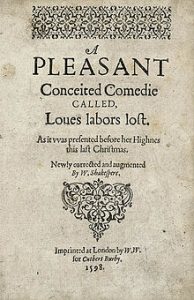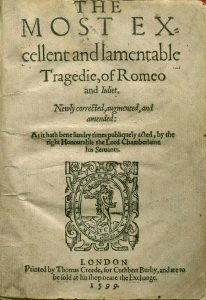However, even putting The Troublesome Reign of King John aside, we must ask how so many plays came to be published under Shakespeare’s name that were not his own. The ‘rogue publisher’ theory is appealing enough as a generality, but on interrogating the individual circumstances of each publisher and play, it begins to fall apart. The evidence suggests that Shakespeare acted as a broker in other areas of business, and George Buck’s approach to both him and Edward Juby on a matter of attribution suggests that he, like Juby, was fulfilling the broker’s role for his company. He is also, as we have seen, the best fit for Ben Jonson’s Poet-Ape: someone who transitioned from ‘buy[ing] the reversion of old plays’ to ‘mak[ing] each man’s wit his own’, and if Poet-Ape is Shakespeare, this is a viable explanation for the evidence pattern that we have.
 Now the difficult question must be asked. Many canonical plays had very similar title pages to the apocryphal plays. Locrine was ‘Newly set forth, overseen and corrected, / By W.S.’. Between 1598 and 1604, five different quartos were published with claims that the plays involved were edited (four of them explicitly by Shakespeare) for publication. In 1598, Cuthbert Burby published Love’s Labour’s Lost, ‘Newly corrected and augmented by W. Shakespere’. In 1599, Andrew Wise (who had already published Richard II and Richard III as ‘By William Shake-speare’) published 1 Henry IV as ‘Newly corrected by W. Shake-speare.’
Now the difficult question must be asked. Many canonical plays had very similar title pages to the apocryphal plays. Locrine was ‘Newly set forth, overseen and corrected, / By W.S.’. Between 1598 and 1604, five different quartos were published with claims that the plays involved were edited (four of them explicitly by Shakespeare) for publication. In 1598, Cuthbert Burby published Love’s Labour’s Lost, ‘Newly corrected and augmented by W. Shakespere’. In 1599, Andrew Wise (who had already published Richard II and Richard III as ‘By William Shake-speare’) published 1 Henry IV as ‘Newly corrected by W. Shake-speare.’
 In the same year, Thomas Creede (publisher of Locrine) printed the (still anonymous) Romeo and Juliet for Cuthbert Burby as ‘Newly corrected, augmented and amended’. In 1602, Creede printed a new edition of Richard III for Andrew Wise as ‘Newly augmented, by William Shakespeare.’ Nicholas Ling’s 1604 Hamlet stated it was ‘By William Shakespeare. Newly imprinted and enlarged to almost as much again as it was, according to the true and perfect Copy.’ Bearing in mind the possibility that Shakespeare was a play-broker who graduated from being the editor of works, to representing the works of others as his own, to what extent can we be sure that Shakespeare was the author of these plays?
In the same year, Thomas Creede (publisher of Locrine) printed the (still anonymous) Romeo and Juliet for Cuthbert Burby as ‘Newly corrected, augmented and amended’. In 1602, Creede printed a new edition of Richard III for Andrew Wise as ‘Newly augmented, by William Shakespeare.’ Nicholas Ling’s 1604 Hamlet stated it was ‘By William Shakespeare. Newly imprinted and enlarged to almost as much again as it was, according to the true and perfect Copy.’ Bearing in mind the possibility that Shakespeare was a play-broker who graduated from being the editor of works, to representing the works of others as his own, to what extent can we be sure that Shakespeare was the author of these plays?
This, of course, is the meat of the authorship question. But before addressing the evidence in detail, we must first establish the plausibility of the underlying premise, the hidden author.
Click Here to Subscribe and we’ll notify you about new content.